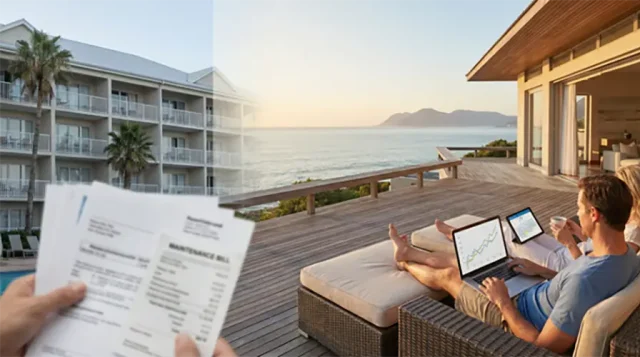
Thinking about dropping $22,000 on a one-week timeshare? Pause.
Analysts project the U.S. short-term–rental market to reach $22.1 billion in 2025 and nearly $29 billion by 2030, letting whole-home owners earn while they travel. Meanwhile, the average buyer shells out $22,942 up front plus about $1,000 every year in rising fees—and 85 percent later regret the purchase.
In this guide, we’ll compare timeshares with professionally managed vacation rentals, unpack three management models, and help you choose the path that builds wealth instead of bills.
Vacation rental vs. timeshare: a quick reality check
A timeshare is a prepaid week; a vacation rental is a real piece of property that can pay you back.
- Timeshare math: The average U.S. buyer paid $22,942 up front in 2024 and now owes about $1,000 every year in rising maintenance fees. Those costs buy no equity and are hard to escape.
- Vacation-rental math: Owners purchase the entire home (often with financing) but can offset those costs with guest revenue. Industry analysts project the U.S. short-term, Airbnb-style rental market will generate $22.1 billion in 2025 and nearly $29 billion by 2030 — revenue that vacation-rental managers like SkyRun, which distribute listings to 70-plus booking sites and report homeowners earning up to 30 percent more after switching, funnel straight to deed holders rather than resort operators.
- Regret factor: Consumer-rights research shows 85 percent of timeshare buyers eventually wish they hadn’t signed— a warning light for would-be investors.
Bottom line: a timeshare locks you into fees for life, while a professionally managed vacation rental can turn the same cash into an appreciating, income-producing asset.
Snapshot table
| Factor | Typical timeshare (one-week share) | Vacation rental with professional manager |
| Up-front cost | $22,942 average buy-in (2024) | ~10–20 percent down on the full purchase price (e.g., $60,000 on a $300,000 home) |
| Annual fees | $1,000+ mandatory maintenance, rising every year | Taxes, insurance, and maintenance, commonly paid out of rental income |
| Flexibility of use | Fixed week or points; peak dates may cost more | Block any dates you want; stay as long as you like |
| Income potential | Minimal; most resorts restrict sub-letting | Revenue from Airbnb/Vrbo bookings can offset costs or create profit |
| Asset value | Often loses 50–90 percent on resale | Real estate has a history of appreciation over time |
| Exit options | Resale market weak; exit companies charge fees | Sell, switch to long-term rental, or keep for personal use—your choice |
One column drains cash; the other can grow equity and income. Next, we’ll meet the management partners that make the profitable side truly hands-off.
How we pinpoint real value, not marketing hype
Here’s the yardstick we use to rate every management company in this guide. Miss on any pillar, and the partnership is not worth your keys.
- Cost and fee transparency. We check the full take-rate, covering commission plus cleaning mark-ups, credit-card surcharges, and any fine-print add-ons.
- Owner income and ROI. We look at calendar fill-rate, dynamic-pricing lift, and, when offered, income guarantees that move vacancy risk away from you.
- Guest experience and reviews. We review average star rating, response-time service-level agreements, and on-site quality controls that keep five-star stays (and nightly rates) high.
- Technology and automation. We track channel reach, smart-pricing algorithms, owner dashboards, and smart-home integrations that cut manual work.
- Flexibility and owner control. We favor unlimited owner stays, contracts that allow month-to-month or easy exits, and zero clauses that mimic timeshare lock-ins.
- Local expertise and support. We confirm in-market teams, vetted vendor networks, and proven compliance know-how for changing city or HOA rules.
We give each pillar equal weight, helping you spot real value before glossy brochures or slick demos try to impress.
SkyRun Vacation Rentals: boutique care at enterprise scale
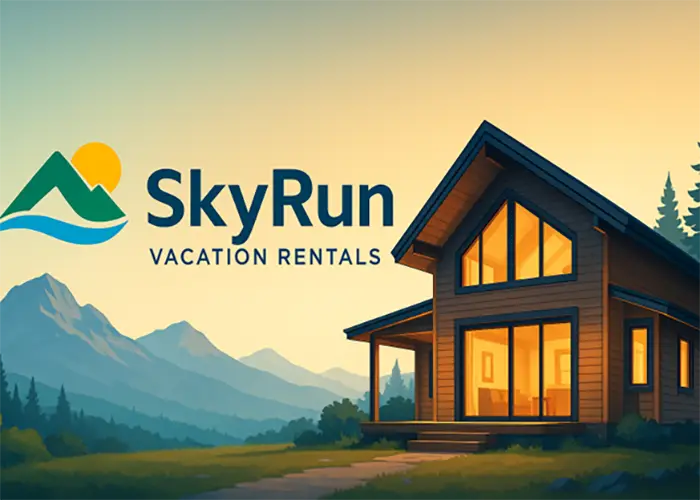
SkyRun combines a neighbor’s handshake with national horsepower. Each franchise is locally owned yet connected to a tech backbone that, as of 2025, feeds listings to 60+ booking channels, runs dynamic pricing, and streams every reservation into an owner app you can check from the departure gate.
Because the franchise owner is your direct contact, you gain one accountable partner who knows the local plumber by name, plus the marketing muscle of a big brand—and SkyRun even ranks among the top vacation-rental franchise opportunities for 2026.
- Flexible fees. Full-service commissions land around 20–25 percent; a co-management tier drops near 15 percent. In some mountain towns, SkyRun even guarantees a fixed rent and takes the vacancy risk.
- Proven lift. Company dashboards show that homes moving to SkyRun are booked 2.4 times more often and earn up to 30 percent more revenue in year one.
Before you sign
Ask for local occupancy stats and cleaner capacity; quality varies by franchise. Compare projected net income with lower-fee rivals to confirm the personal touch is worth the margin.
If you want a manager who treats your cabin like a neighbor’s home yet prices it with big-brand tech, SkyRun strikes that balance, offering the equity, flexibility, and exit freedom a timeshare never will.
Vacasa: full-service reach for owners who want zero homework
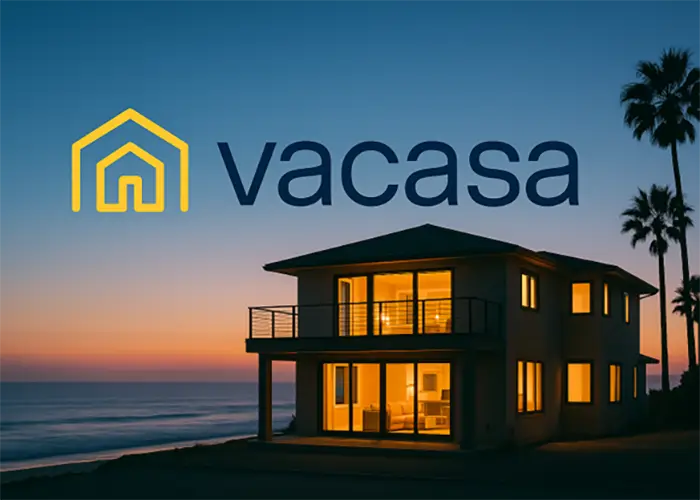
Vacasa manages more than 40,000 vacation homes as of May 2025, giving it the widest footprint in the industry and a pricing engine fueled by real-time data.
What that reach means for you: Vacasa writes your listing, syndicates it to 40-plus booking sites, cleans after every stay, files permits, and even answers 2 am lock-out calls. The experience feels closer to a resort timeshare than to traditional landlording.
You pay for that convenience. The company keeps 25–30 percent of gross rent, the top end of market pricing, but says its dynamic rates lift occupancy enough to offset the fee.
Guest feedback supports the claim: 16,000+ Trustpilot reviews average 4.4 stars (October 2025), a solid score for a portfolio this large.
Where Vacasa shines
- Set-and-forget ownership for distant or busy hosts.
- In-house local teams handle linens, repairs, and permit inspections.
- Data-driven pricing boosts holiday rates and fills mid-week gaps.
Questions to ask before signing
- What is the staff-to-property ratio in your market?
- How much notice do you need to exit the contract?
- How does projected net income compare with a 20 percent-fee competitor?
If time matters more than margin, Vacasa can turn a second home into a hands-off asset, offering everything a timeshare promises while anchoring your money in real property you can sell at any time.
iTrip Vacations: hometown hustle meets national marketing
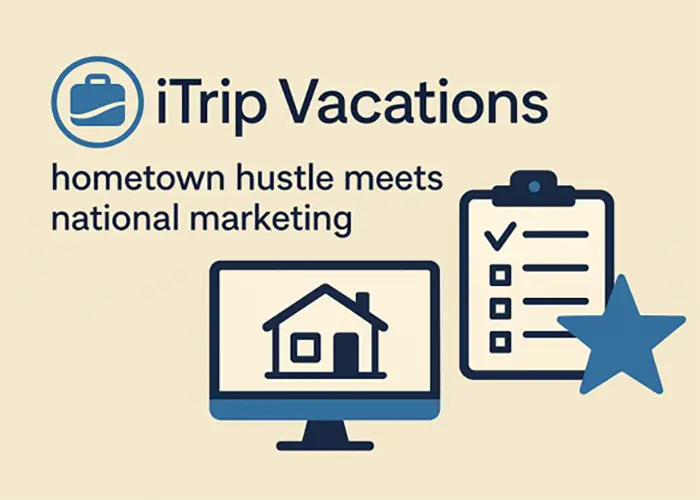
iTrip franchises span more than 100 U.S. destinations as of 2025, blending local ownership with a central engine that publishes your listing on Airbnb, Vrbo, Booking.com, and Marriott Homes & Villas.
That setup trims overhead, so full-service commissions usually sit between 15–25 percent, a notch below Vacasa and similar to SkyRun’s mid-tier. The trade-off is variability: results depend on the franchise you select.
Trustpilot data sends a caution signal. The platform shows a 1.4-star average from roughly 140 reviews (October 2025). Strong offices shine, yet weaker ones pull the brand score down.
When you vet a location, ask: How many homes do you manage? How large is your cleaner roster? What was your guest-rating average last quarter? Top operators answer quickly and supply proof.
Bottom line: iTrip can deliver boutique-level care plus national reach at mid-tier fees if you perform thorough due diligence. Skip that homework and the “discount” may become the costliest lesson on this list.
Grand Welcome: new kid, fast climb, mixed grades
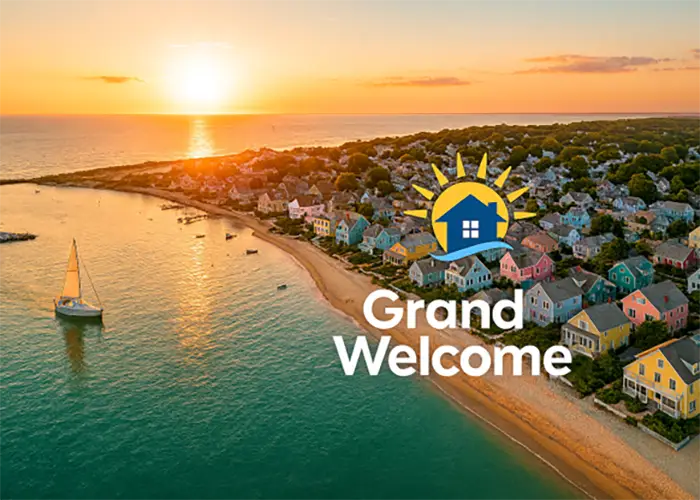
Founded in 2009 and franchising since 2019, Grand Welcome has grown to 68 locations that manage roughly 2,200 homes across 74 U.S. destinations (2025). New franchisees train at “Grand Welcome University,” then connect to a central tech stack that feeds listings to every major OTA, runs dynamic pricing, and fields 24-hour guest calls.
Commission rates sit in line with the big brands at 20–30 percent of gross bookings, yet young offices often lure early clients with intro discounts and flexible contracts.
Reputation trails the rapid expansion. Trustpilot shows a 2.6-star average from about 12 reviews (October 2025), suggesting uneven execution while new owners staff up.
Tilt the odds in your favor: confirm cleaner headcount, request first-year occupancy targets, and monitor the first ten guest stays closely. Secure a strong franchisee and you gain an eager partner with modern tech; choose poorly and you may become the case study they fix next quarter.
Grand Welcome offers full-service convenience in markets the giants skip, but the partnership is still writing its playbook. If you accept that risk-reward profile, the payoff can rival any established manager while timeshares stay stuck in 1995.
Evolve: low fees, high control, some elbow grease required
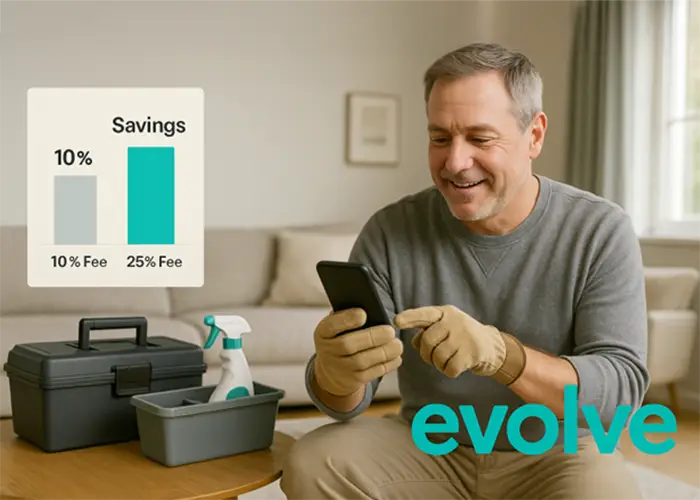
Evolve charges a flat 10 percent of every booking (2025 pricing), well below the 20–30 percent norm. In exchange it delivers professional photography, Airbnb-style multi-channel marketing, dynamic pricing, and 24-hour guest messaging. All on-site tasks, though, stay with you or the local vendors you hire.
Run the math: on a home that grosses $80,000 a year, Evolve keeps $8,000. A 25 percent full-service manager would take $20,000. Even after paying cleaners and a handyman (about $10,000 in Evolve’s own example), you still keep several thousand dollars more.
Risk stays low thanks to month-to-month terms and a six-month money-back guarantee on management fees. That safety net helps Evolve hold a 4.0-star Trustpilot average from more than 5,000 reviews (October 2025).
Where the deal tightens: you (or a trusted contact) answer the midnight leak call, Evolve keeps 10 percent of the cleaning fee, and its pricing algorithm may favor occupancy over rate, so savvy owners raise peak-season prices manually.
Choose Evolve if maximizing margin outranks minimizing effort and you have reliable local help. Skip it if you live a flight away or never want your phone buzzing during dinner. In the right hands, Evolve can turn one spare week into a stronger bottom line than any timeshare ever promised.
Quick-glance scorecard: five services, one decision
| Company | Core model | Commission | Contract flexibility | Avg. guest rating* | Homes managed* |
| SkyRun | Franchise, full service | 20–25 percent<br>(15 percent co-manage) | Cancel anytime | 4.8★ (portfolio) | 1,200+ |
| Vacasa | Corporate, full service | 25–30 percent | 60-day notice | 4.4★ (16,000) | 40,000+ |
| iTrip | Franchise, full service | 15–25 percent | Varies by office | 1.4★ (≈140) | 10,000+ |
| Grand Welcome | Emerging franchise | 20–30 percent | Office-set, generally flexible | 2.6★ (12) | 2,200+ |
| Evolve | Marketing only | 10 percent flat | Month-to-month plus six-month refund | 4.0★ (5,000+) | 30,000+ |
*Ratings and unit counts reflect Trustpilot or company data as of October 2025. Verify current figures during due diligence.
A few takeaways:
- Vacasa excels on scale and standardization, but you pay for every ounce of convenience.
- SkyRun shows boutique care can deliver hotel-level ratings without top-shelf fees.
- iTrip and Grand Welcome prove franchise quality rises or falls with the local operator, so interview the people, not just the logo.
- Evolve confirms low fees work if you are ready to handle some hands-on tasks.
Which path fits you? Follow the decision trail
Ask yourself one honest question: Do you value time, money, or control the most?
- Time is priceless. Choose Vacasa if you want resort-style convenience and can accept a 25–30 percent fee. Beyond a 60-day exit notice, you will rarely lift a finger.
- Balance and personal touch matter. Pick a franchise partner for hands-off help at mid-tier pricing.
- SkyRun — no lock-in and 4.8★ guest ratings.
- iTrip or Grand Welcome — lower fees, but verify the local owner’s numbers first.
- Profit tops the list. Go with Evolve when you have trusted cleaners and want to keep about 90 percent of gross rent. Month-to-month terms and a six-month refund lower the risk, but the 2 am leak call is yours.
Whatever lane you choose, do not judge on fees alone. A “cheap” manager who misses bookings costs more than an “expensive” one who fills the calendar. Compare projected net income, exit clauses, and verified guest reviews before signing.
Conclusion
A timeshare pre-pays for the same week in the same place—and locks you into rising fees with little control or resale value. A vacation home, professionally managed, can be an appreciating asset that earns income, funds your own trips, and stays flexible as your life changes.
The services in this guide simply offer different paths to that outcome: Vacasa for maximum convenience, Evolve for maximum margin if you’ll stay involved, and iTrip/Grand Welcome as mid-fee options that depend heavily on the local franchise. SkyRun stands out by pairing that franchise-level personal care with national tech, dynamic pricing, and broad channel reach—without the “forever” contracts and regret rates that haunt timeshares.
Put the numbers side by side: the $22,000+ timeshare buy-in and annual fees versus a down payment on a whole home plus projected rental income. Ask every contender the same questions about net income, guest ratings, owner stays, and exit terms. Choose wisely and you’re not just buying vacations—you’re building an asset that can help pay for them. Choose poorly (or stick with a timeshare) and you’re still funding someone else’s postcard collection.





